
Learn from experience
Remember when you used a friend’s benzoyl peroxide-based touch stick for zits and woke up with your eyes swollen shut? Or that time you used a powerful mud mask and your face burned for hours? You might want to forget these episodes as soon as possible, but don’t. “Listen to your skin and pay attention to what has caused irritation in the past,” says Jonathan Kantor, MD, medical director at the Florida Center for Dermatology, in Augustine, Florida. Don’t dismiss any skin reactions you’ve previously had, no matter how major or minor it seemed at the time. It’s important to keep track of past triggers, which may range from beauty products to household chemicals, so you can avoid them going forward.
(Also, check out the common skin-care ingredients that are causing you to break out.)
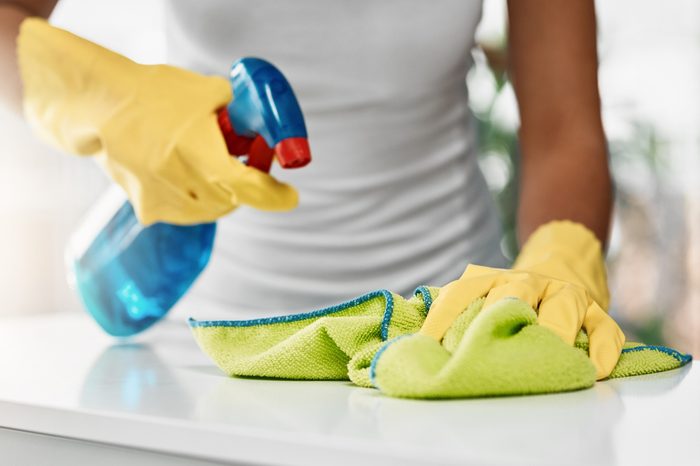
Choose gloves carefully
If you’re looking to buy a pair of protective gloves—for dishwashing or hair dying or other messy projects, choose wisely. Wearing gloves made of latex or nitrile for a long time may create a sweaty environment that can take any skin issues from mild to serious, according to Dr. Kantor. He especially warns of rashes, bumps, or blisters that start to appear on the sides of your fingers. This, in conjunction with sweating on your hands, may indicate a kind of hand dermatitis. Ideally, it’s best to seek the professional advice of a dermatologist.
Also, learn about the skin conditions that look like acne but aren’t.)

Don’t play the comparison game
Skin sensitivity isn’t a one-size-fits-all issue, so be careful not to compare your skin reactions or regimens with that of a friend or relative, even if she also has sensitive skin. For example, Dr. Kantor explains that you might be bothered by extremely mild chemicals while someone else may be effected only by bleach solutions. Just because a product is tolerable for your friend does not make it tolerable for you. (Here are the best moisturizers for sensitive skin.)
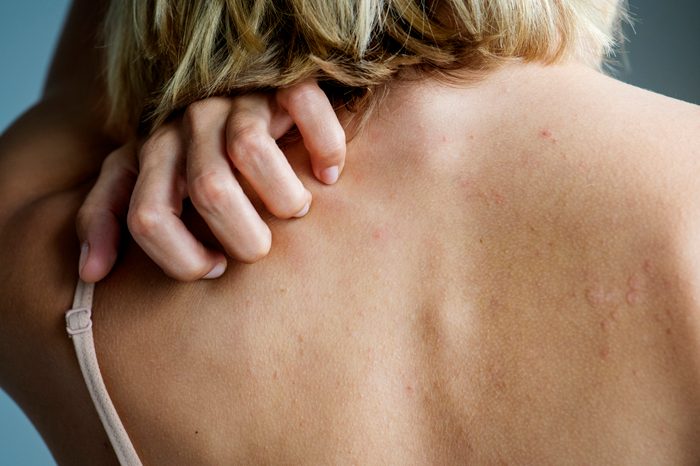
Know your irritants vs. allergens
Some chemicals, like chlorine bleach, bother everybody, and will almost always cause skin irritation. Then there are substances that bother only some people, and those are considered allergens. Some common skin allergens are the nickel in inexpensive jewellery, everyday fragrances, an antibiotic called neomycin, and the widely used preservatives methylchloroisothiazolinone and thimerasol. According to the American Academy of Dermatology, methylchloroisothiazolinone is a “formaldehyde-like” chemical that often shows up as a cosmetic preservative, and thimerasol is found in certain vaccines and contact lens solutions.

Beware of long ingredients lists
People with sensitive skin should pay close attention to a product’s ingredient list. Avoiding products that contain fragrances, soap, and alcohol will help patients with sensitive skin maintain skin health, according to the American Academy of Dermatology (AAD): “Calming ingredients, such as green tea polyphenols, chamomile, and aloe are beneficial and, as a general rule, the fewer ingredients in a product the better.” (Check out the surprising health benefits of aloe.)
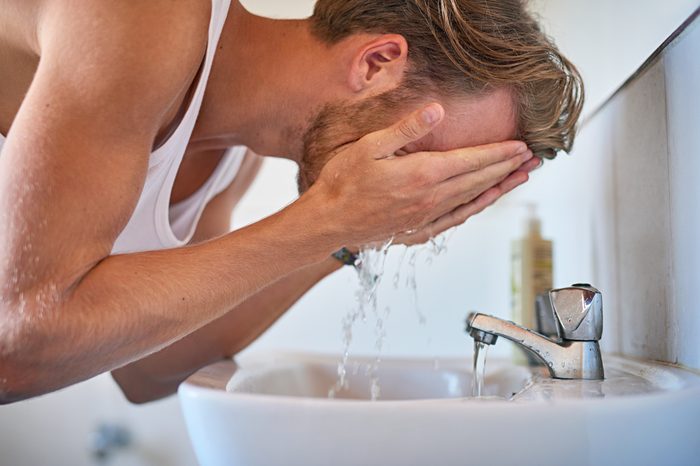
Resist the urge to lather, rinse, repeat
If you’re inclined to wash your face more than once during the day, don’t. One daily cleanse is sufficient to maintain clean skin, and any more than that can upset sensitive skin, per the AAD. And don’t even think about exfoliation. That too can exacerbate your sensitive skin issues.
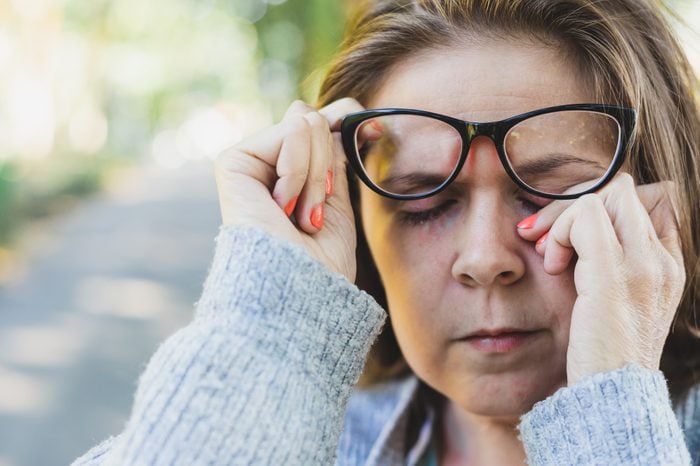
Be on the lookout for triggers
Every single thing you come in contact with during the day has the potential to aggravate your sensitive skin. “If you notice that your upper eyelids are constantly irritated,” Dr. Kantor says, “one possibility is an allergy to nail polish or polish remover.” In that instance, you may be rubbing your eye area, unaware that nail polish remover is a potential culprit. The same idea applies to any correlations between mouth irritations (including canker sores) and toothpaste and/or mouthwash. Take note, and mention your observations to a dermatologist. (Check out what your skin reveals about your health.)
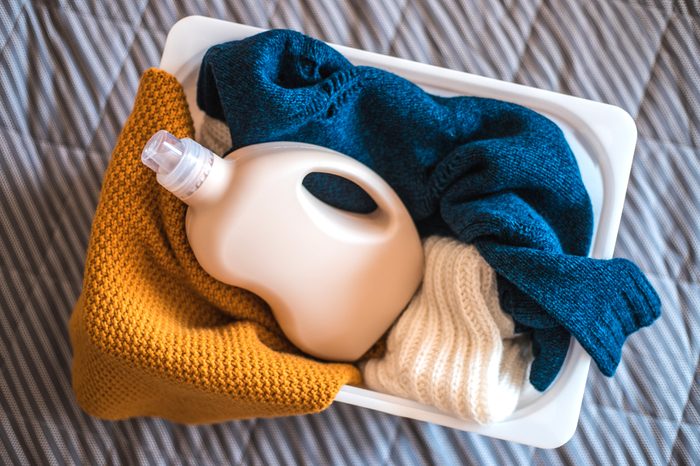
Wash before use
To make clothes look more appealing on the rack, manufacturers will sometimes coat them with a chemical finish that looks nice but can trigger skin problems. If you have eczema or sensitive skin, the National Eczema Association suggests always washing new clothes before you wear them. Also, wash cloth-napkins and bedding before first-time use. Also, try these top creams for eczema.
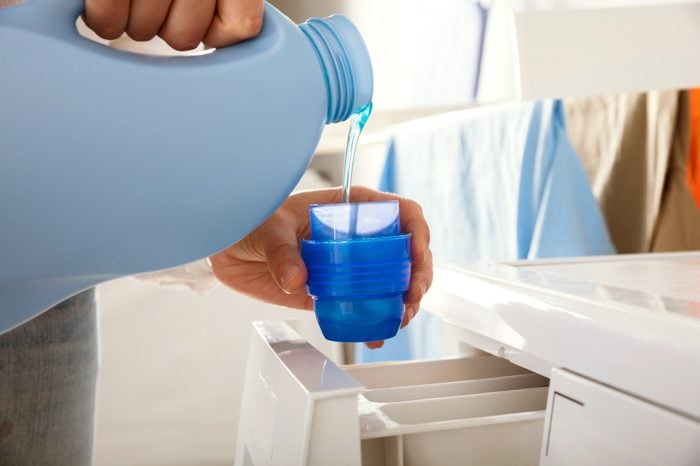
Ditch regular laundry detergent
Finding the laundry detergent that’s best for your sensitive skin might involve some trial and error, according to the National Eczema Association. But it’s always a safe bet to buy laundry detergents that are hypoallergenic, made for sensitive skin, and fragrance and dye-free. You’ll also want to choose liquid detergents over powdered ones, as the liquid version has been shown to have fewer residues and will likely be less irritating.
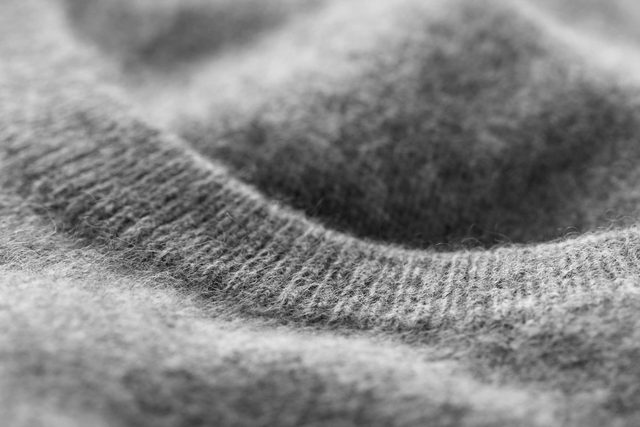
Dress for your skin type
Avoid clothing that could aggravate your sensitive skin. That means steering clear of wool or anything that’s too tight, and being aware of elastics (think bras, underwear, some waistbands). Their friction against your skin—especially if coupled with sweating—can lead to itching, rashes, and a host of irritating dermatologic conditions.

See a pro
If you think you’re allergic to something, don’t do your own guesswork—take it to a dermatologist or allergist. The longer you expose yourself to items that may be wreaking havoc on your sensitive skin, the worse your skin will become. A doctor will help assess your particular skin triggers by administering a patch test; then they’ll provide appropriate skin-saving recommendations, from sensitive skincare product advice to prescription medications that may help.
Next, learn how dermatologists update their skin care for spring.
